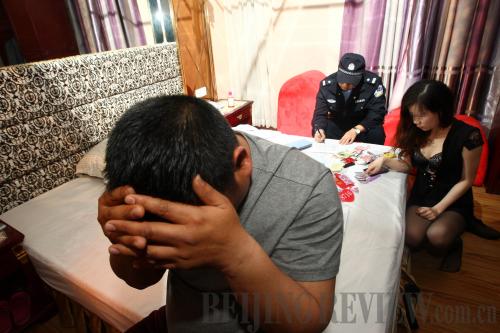|
 |
|
SHAME ON YOU: A policeman takes written declaration of two people caught engaging in a sexual transaction trade in Guo'an Hotel in Dongguan City, Guangdong Province, on February 9 (XINHUA) |
On February 13, Yan Xiaokang, Vice Mayor of Dongguan and head of the city's Public Security Bureau, was removed from his post for dereliction of duty. Local deputy police head Lu Weiqi and several other officials were sacked.
On February 16, the MPS told police all over the country that it will severely punish those who are found guilty of misconduct and malpractice in prostitution crackdowns, as well as those who break laws while in charge of enforcement.
"No matter who is involved, no matter how high their positions, all must be investigated to the end, with absolutely no tolerance," said the ministry.
Controversy
Prostitution has been outlawed in China since the People's Republic of China was founded in 1949. But the country's sex trade has still gained ground in the past three decades.
The first case of prostitution that was officially recorded since the outlawing was in 1976 in Hangzhou, east China's Zhejiang Province. In 1979, similar cases were reported in Shanghai and Guangzhou, capital of Guangdong. In 1980, the MPS instigated a large-scale prostitution crackdown. The first nationwide raid was launched in 1989, with similar operations having been conducted almost annually since then. In addition, more than 60 laws and regulations aimed at wiping out prostitution were promulgated between 1981 and 2007.
Statistics from the MPS showed that police apprehended 19,000 suspects and broke up 6,323 pornography-related gangs in 2013 alone, resulting in 12,000 cases being solved.
"These deeds have shown the government's firm stance against prostitution, which is a source of instability in society," said Wang Hongjun, an official from People's Public Security University of China.
However, a number of social networking website users expressed sympathy for Dongguan's prostitution industry after the recent crackdown, posting comments such as "Dongguan, hang in there!" and "Today we are all Dongguan people."
Some argued that prostitution is based on "market demand" and is "beneficial," and called for sex work to be legalized." Such widespread online backlash against CCTV reflects the conflict between mainstream social values and negative thoughts," said Liu Dongchao, a professor at the Chinese Academy of Governance.
On December 23, 2013, the General Office of the CPC Central Committee issued a detailed guideline on bolstering core socialist values to realize the Chinese dream of national renewal.
According to the guideline, core socialist values include the national goals of prosperity, democracy, civility, and harmony; the social goals of freedom, equality, justice and the rule of law; and the individual values of patriotism, dedication, integrity and friendship.
President Xi Jinping on February 17 called for greater efforts to promote such values and set up a value system with Chinese characteristics in line with the modern era. The ongoing prostitution and pornography crackdown is considered to echo Xi's call.
"Those who think prostitution and pornography are not newsworthy have been misled. Both the government and society need to realize the seriousness of the problem," said Fang Jundong, secretary of the Communist Youth League of China Committee of South China University of Technology in Guangzhou.
Social openness and freedom have increased over the past three decades, accompanied by excessive liberalism, which has harmed social morality, said Liu with the Chinese Academy of Governance, referring to online "support" for those involved in the Dongguan scandal.
An article carried by People's Daily asserted that prostitution unquestionably crosses the moral line of personal freedom and is bound to involve social corruption, human trafficking and organized crime, adding that intervention of public power in the business is an international practice.
Email us at: yuanyuan@bjreview.com | 